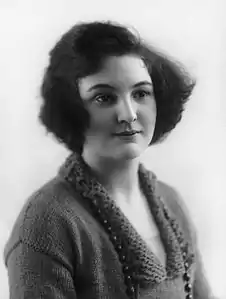Lady Eleanor Smith
Lady Eleanor Furneaux Smith (7 August 1902[1] – 20 October 1945) was an English writer and active member of the Bright Young Things.[2]
Lady Eleanor Smith | |
|---|---|
 Lady Eleanor Furneaux Smith (1920), from the National Portrait Gallery, London | |
| Born | Eleanor Furneaux Smith 7 August 1902 Birkenhead, Cheshire, England |
| Died | 20 October 1945 (aged 43) Westminster, London, England |
| Occupation | Writer |
| Genre | |
| Parents | F. E. Smith, 1st Earl of Birkenhead Margaret Furneaux |
| Relatives | Henry Furneaux (maternal grandfather) |
Life
Born in Birkenhead, Smith was the eldest of three children born to politician F. E. Smith, and Margaret Furneaux, daughter of the academic Henry Furneaux. Her brother was Frederick Smith, 2nd Earl of Birkenhead, and her sister Lady Pamela married Hon. Michael Berry. Her father was created Earl of Birkenhead in 1922.[3]
She went to Miss Douglas's school at Queen's Gate. At Queen's Gate she met Allanah Harper and Zita Jungman and together they became early members of what the British press would call the "Bright Young Things".[4]
Smith worked as a society reporter and cinema reviewer for a while, then as a publicist for circus companies. In the latter role she travelled widely, and gained inspiration for her third career, writing popular novels and short stories which often provided the basis for the "Gainsborough melodramas" of the period. These stories often had a romanticised historical or Gypsy setting, based on her own research into Romany culture (she believed one of her paternal great-grandmothers to have been a Gypsy).[5] Smith also wrote ghost stories; many of them were collected in her book Satan's Circus (1932).[5] Smith was a supporter of the Conservative Party.[5] In 1937, she responded to Nancy Cunard's survey of writers and poets on the topic of the Spanish Civil war, saying that she was a "warm adherent of General Franco."[6]
She died in Westminster in 1945 after a long illness.[2] Her requiem mass was conducted by Father Martin D'Arcy at Church of the Immaculate Conception, Farm Street on 31 October 1945. Her mass was attended by several other members of literary and high society, including Sir Osbert Sitwell Maureen, Marchioness of Dufferin and Ava, Cathleen, Marchioness of Queensberry; Margaret, Countess of Kimberley; Ann, Viscountess Rothermere; Bridget Parsons, and Lord Pakenham.[7]
In 1953, after her death, her brother, published a memoir about Smith.
Works
Novels
| Year | Novel | Film adaptation |
|---|---|---|
| 1930 | Red Wagon | Red Wagon (1933) |
| 1931 | Flamenco | |
| 1932 | Ballerina | The Men in Her Life (1941) |
| 1935 | Tzigane | Gypsy (1937) |
| 1936 | Portrait of a Lady | |
| 1938 | The Spanish House | |
| 1940 | Lovers' Meeting | |
| 1942 | The Man in Grey | The Man in Grey (1943) |
| 1943 | Caravan | Caravan (1946) |
| 1944 | Magic Lantern |
Short stories
| Year | Books | Notes |
|---|---|---|
| 1932 | Satan's Circus | |
| 1933 | Christmas Tree | |
Others
| Year | Work | Notes |
|---|---|---|
| 1948 | British Circus Life | |
| 1983 | Cornish Coastal Walks for Motorists | |
| 1992 | Coastal Walks in Cornwall | |
| 1995 | Short Walks from Cornish Pubs | |
| Mrs. Raeburn's Waxwork | ||
| No Ships Pass |
Notes
- 1939 England and Wales Register
- "Lady Eleanor Smith – Novels of Gypsies and of the Circus". The Times. The Times Digital Archive. 22 October 1945. p. 6.
- Burke, Sir Bernard, ed. (1939). Burke's Peerage, Baronetage & Knighthood (97th ed.). Burke's Peerage & Gentry. p. 300.
- D J Taylor (30 September 2010). Bright Young People: The Rise and Fall of a Generation 1918-1940. Random House. pp. 24, 55. ISBN 978-1-4090-2063-9.
- Richard Dalby, (editor) The Virago Book of Ghost Stories: The Twentieth Century: Volume Two.Virago, London, 1991. 1-85381-454-7 (p.318).
- Cunard, Nancy. "Authors Take Sides of the Spanish Civil War" (PDF).
- "Requiem Mass – Lady Eleanor Smith". The Times. The Times Digital Archive. 1 November 1945. p. 6.